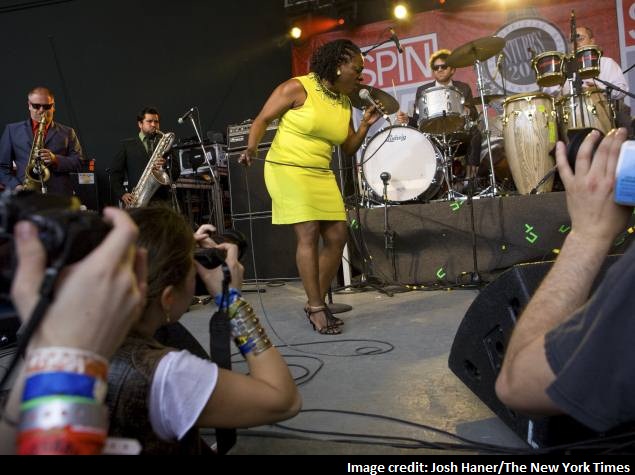- Home
- Internet
- Internet News
- Indie Music's Digital Drag
Indie Music's Digital Drag

But despite the celebratory atmosphere, anxiety about competition and fairness in the digital marketplace runs deep in the independent sector of the music industry. Small labels complain that consolidation by the major record companies has left them squeezed in negotiations with the online music services that now account for a majority of their revenue.
Executives and advocates for the indies say they are vulnerable to strong-arm tactics by Internet giants like YouTube, which has recently threatened to block some labels' videos unless they sign new licensing deals. Like the standoff between Amazon and the book publisher Hachette, the dispute has crystallized a fear that access to the online marketplace controlled by a few has become a privilege affordable only by the biggest and richest players.
"In the growth of the Internet, what was to be a utopian leveling of the playing field, a democratization for all, what is actually happening is a form of cultural apartheid," said Alison Wenham, chief executive of the Worldwide Independent Network, an umbrella group for small labels.
The YouTube battle involves a long-delayed effort by the online video giant to develop a paid, advertising-free premium version to compete against subscription music services like Spotify, Rdio and Beats Music. YouTube, a division of Google, has made licensing deals with Universal, Sony and Warner, the three major labels, but it has stalled with the independents, which contend that YouTube has offered them inferior terms.
(Also see: Indie Music Labels Protest YouTube's Streaming Service Plans)
As the indies tell it, the dispute is typical of their disadvantage in the larger digital sphere.
On Wednesday, Darius Van Arman, a co-founder of the Secretly Group, whose acts include indie stars like Bon Iver and Dinosaur Jr., will speak before a House Judiciary subcommittee as part of a hearing on music licensing. In a statement supplied to the subcommittee in advance, Van Arman said that in the streaming age, "the three major recording companies have become proficient at extracting a disproportionate share of copyright-related revenue from the marketplace."
In the YouTube negotiations, no label has come forward with specific complaints about the contract terms in dispute. But details published by Billboard magazine and the blog Digital Music News, which purport to be from leaked contracts, reveal sticking points like a "negative most-favored nation clause," meaning that if YouTube strikes a lower deal with any label, it can reduce all rates accordingly.
Which labels and bands will be affected - and what will happen to their videos - is not clear. According to a number of people who have been engaged in talks with YouTube, the company is threatening to block videos from indie labels' official channels; videos uploaded by users would remain on the site, but yield no advertising revenue.
Yet how much money is at stake is unknown. According to the Recording Industry Association of America, which primarily represents the major labels, YouTube and other so-called on-demand, ad-supported services made $220 million in revenue for the music industry last year, about as much as vinyl records; by comparison, download sales were $2.8 billion.
A YouTube spokesman said the company had already signed deals with 95 percent of its label partners, but declined to comment further on negotiations.
"Our goal is to continue making YouTube an amazing music experience, both as a global platform for fans and artists to connect, and as a revenue source for the music industry," the spokesman, Matt McLernon, said in a statement. "We're adding subscription-based features for music on YouTube with this in mind."
(Also see: YouTube Resists Indie Music Streaming Ultimatum: Representative Body)
One of the independents' main complaints about the major labels with which they compete is how market share is computed. According to Van Arman and Richard Bengloff, president of the American Association of Independent Music, a trade group, the big labels overstate their share of the music market by counting not only recordings that they own, but also those that they distribute and that are owned by independents. Each of the big labels has distribution subsidiaries that handle hundreds of independents, leading to a wide gray area in which both the majors and the indies claim control.
Universal, the world's biggest music company, sells or distributes 38.9 percent of the music in the United States, according to data from Nielsen SoundScan. But measured strictly by copyright ownership, Universal has only about 28.5 percent of the market, while independents collectively hold about 34.6 percent, according to the American Association of Independent Music.
Market share is important leverage in negotiations with digital services over licensing terms, and the independents claim that the majors' inflated share allows them to demand higher royalty rates as well as other payments like minimum guarantees and large advance payments. Those payments may be unavailable to indies, or available only in much smaller amounts.
The fight with YouTube is only the latest to galvanize the independent sector, as technology companies like Apple, Amazon and Pandora have become the most powerful outlets for music and years of mergers have resulted in a concentration of power among just three major labels.
"Even if the market shares were more accurately measured, we would still have the inescapable fact that the three big labels account for the majority of music sales and the indies only have an impact as a collective," said Mark Mulligan, a digital media analyst and consultant.
Representatives of the three major labels declined to comment on how market share was used in licensing negotiations.
In some ways, the new digital marketplace has helped the indies flourish. Music on smaller labels tends to perform better on digital outlets like Spotify and iTunes than it did when the market was dominated by brick-and-mortar stores, and the cost of promotion presented a higher barrier. Merlin, an agency that negotiates digital deals for hundreds of indies, said that streaming services brought $89 million in revenue to its members from May 2013 to April 2014.
Yet indie executives say the YouTube and Amazon deals show how fragile access to the marketplace can be.
"I don't have any idea what this business is going to be like in a year, much less five years," said Bruce Iglauer, the founder of the Chicago blues label Alligator Records who received a lifetime achievement award at the Liberas.
Last week, the dispute spilled out into the streets of New York. Saturday afternoon, a few dozen supporters of the Content Creators Coalition, an artists' advocacy group, picketed Google's office, playing New Orleans-style marches on horns and carrying signs like "Economic justice in the digital domain" and "What YouTube pays? Nothing."
Marc Ribot, a guitarist who has played with stars like Tom Waits and Elvis Costello, summarized how the larger conflict over streaming revenue affected artists' careers.
"If we can't make enough from digital media to pay for the record that we've just made," Ribot said, "then we can't make another one."© 2014, The New York Times News Service
Catch the latest from the Consumer Electronics Show on Gadgets 360, at our CES 2026 hub.
Related Stories
- Samsung Galaxy Unpacked 2025
- ChatGPT
- Redmi Note 14 Pro+
- iPhone 16
- Apple Vision Pro
- Oneplus 12
- OnePlus Nord CE 3 Lite 5G
- iPhone 13
- Xiaomi 14 Pro
- Oppo Find N3
- Tecno Spark Go (2023)
- Realme V30
- Best Phones Under 25000
- Samsung Galaxy S24 Series
- Cryptocurrency
- iQoo 12
- Samsung Galaxy S24 Ultra
- Giottus
- Samsung Galaxy Z Flip 5
- Apple 'Scary Fast'
- Housefull 5
- GoPro Hero 12 Black Review
- Invincible Season 2
- JioGlass
- HD Ready TV
- Laptop Under 50000
- Smartwatch Under 10000
- Latest Mobile Phones
- Compare Phones
- Samsung Galaxy A07 5G
- Vivo Y500i
- OnePlus Turbo 6V
- OnePlus Turbo 6
- Itel Zeno 20 Max
- OPPO Reno 15 Pro Mini 5G
- Poco M8 Pro 5G
- Motorola Signature
- Lenovo Yoga Slim 7x (2025)
- Lenovo Yoga Slim 7a
- Realme Pad 3
- OPPO Pad Air 5
- Garmin Quatix 8 Pro
- NoiseFit Pro 6R
- Haier H5E Series
- Acerpure Nitro Z Series 100-inch QLED TV
- Asus ROG Ally
- Nintendo Switch Lite
- Haier 1.6 Ton 5 Star Inverter Split AC (HSU19G-MZAID5BN-INV)
- Haier 1.6 Ton 5 Star Inverter Split AC (HSU19G-MZAIM5BN-INV)
















